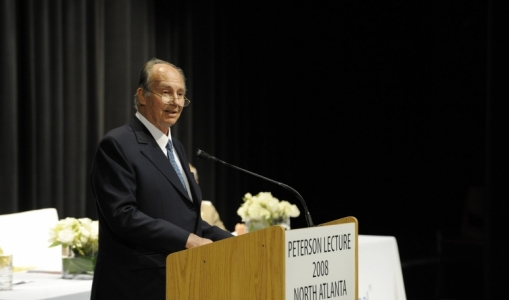Aga Khan speaks at the 2008 Peterson Lectures in Atlanta, Georgia, U.S.A 2008-04-18
VIDEO ON: http://www.ismaili.net/timeline/2008/us/20080424global.html
Prince Karim Aga Khan, a billionaire philanthropist and spiritual leader of some 20 million Muslims worldwide, stressed the importance of education in the age of globalization in Atlanta as he helped the International Baccalaureate celebrate its 40th anniversary.
The International Baccalaureate, or IB, has programs for students aged 3-19 at 2,300 participating schools in 126 countries, said Monique Seefried, chair of the IB Board of Governors.
Ms. Seefried, along with IB Director General Jeff Beard, hosted a delegation of educators from around the world April 15-18. The trip featured visits to local schools and culminated in the annual Peterson Lecture, which this year was delivered by the Aga Khan at North Atlanta High School.
Revered as a descendant of the Prophet Muhammad and the imam of the minority Shi’a sect of Ismaili Muslims, the Aga Khan heads the Aga Khan Development Network, which employs nine interrelated agencies to alleviate poverty in underprivileged countries.
The 70-year-old leader recently visited many states during the U.S. leg of a 30-country tour that began last July to commemorate his “Golden Jubilee,” 50 years of service in the spiritual office he inherited from his grandfather at the age of 20.
The Harvard-educated leader was met with cordial applause as he entered a packed auditorium at North Atlanta High School, one of the first schools in Georgia to offer IB programs. The diverse crowd included Ismaili adherents eager to lay eyes on their spiritual leader, IB students and officials, diplomats and businesspeople.
In the lecture, the Aga Khan stressed tolerance based on the Qur’anic view of humanity’s shared origins as children of God. He also highlighted education as a gateway to opportunity and prosperity in underdeveloped nations.
“The International Baccalaureate program incarnates a powerful idea, the confidence that education can reshape the way in which the world thinks about itself,” he said.
Born in Geneva, the Aga Khan spent his early childhood in Kenya before moving back to Switzerland, where he attended Le Rosey, a prestigious boarding school that now offers IB programs. Like many other international organizations, the IB is headquartered in Geneva.
In his speech, the Aga Khan recalled the infectious advice of a highly educated Czech refugee who took a job coaching at the Swiss school to make ends meet after fleeing his homeland. While leading the school’s rowing and ice hockey teams, he always sought to instill in his athletes the value of a good education.
When the coach was set to apply for political asylum in the U.S., the Aga Khan wondered aloud how he would subsist. An education, the coach said, would help him secure employment.
“The moral of the story is clear. You can have nothing in your pocket and only the clothes on your back and the shoes on your feet, but if you have an educated mind, you will be able to seize all the opportunities life offers,” the Aga Khan said.
The Aga Khan, who holds head-of-state status when traveling abroad and is addressed as “Your Highness,” announced the coming establishment of the first Aga Khan Academies in Afghanistan, which will be the first schools in the war-torn nation to offer IB curricula.
The Afghan schools will join a growing network of Aga Khan Academies across South Asia, Africa and the Middle East, which provide educational opportunities to excelling students regardless of their race, gender or religious backgrounds.
The schools represent a critical crossroads in the IB’s role as an organization known for fostering cultural understanding, he said.
Traditionally implemented in parts of the world with a Judeo-Christian worldview, the IB is shifting into the Muslim world, softening the so-called “Clash of Civilizations” caused by the ignorance with which the Christian and Muslim worlds approach each other, the Aga Khan said.
Karim Thomas, an IB student during his four years in high school, said the international tinge to his education influenced his decision to work in Afghanistan since his graduation. He said has seen firsthand the benefits of education in the developing world.
“In Afghanistan, I have experienced the joy on the face of fathers who’ve seen their daughters go to school for the first time…” said Mr. Thomas, whose remarks preceded the Aga Khan.
The Aga Khan also said educators must prepare for unique challenges in an era where increasing globalization brings “myriad blessings and serious risks.”
The paradox is that nations can now easily establish cross-cultural relationships, but this opportunity carries with it the threat of seeing individual identities dissolve, he said. And some cultures bristle at globalization’s intrusion and end up on the opposite extreme by responding with isolationism.
These competing forces must be tempered by the savvy global citizens educational programs like the IB can help create, he said.
Before delivering the Peterson Lecture, the Aga Khan was honored at a luncheon hosted by Georgia Gov. Sonny Perdue at the Governor’s Mansion.
In February, the University System of Georgia’s board of regents approved a new policy that will allow high school graduates to get college credit for IB courses after passing a test.
| Attachment | Size |
|---|---|
| GlobalAtlanta.htm | 5.88 KB |
| Atlanta.mp4 | 15.77 MB |
- 8270 reads
 Ismaili.NET - Heritage F.I.E.L.D.
Ismaili.NET - Heritage F.I.E.L.D.